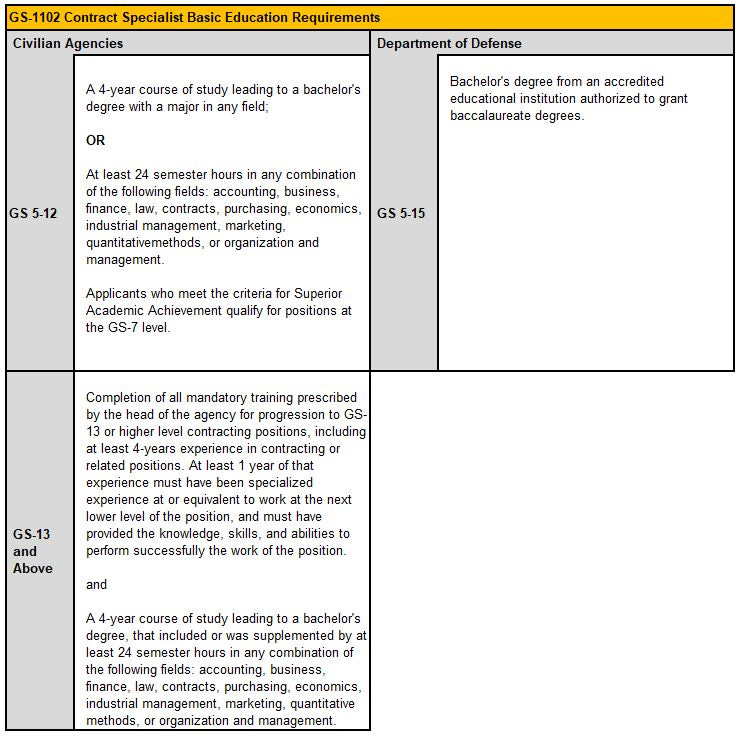Basic Education Requirements to Be an 1102 (Contract Specialist)
Another Case of A Rose is Not a Rose Is Not a Rose
Back in the dark ages, all you needed to qualify for a GS-1102 Contract Specialist job was a four-year college degree, in any field. At that time (1987), the Navy command that was looking to hire me preferred social science and science majors over business majors, and that is a whole different post.

Beyond the degree requirement, it was hard to get hired into the them Mechanicsburg Navy Intern Program unless you had a 3.5 or higher GPA for all four years of your degree, even if you transferred schools and grades did not follow you to your new school. That is why I got hired as a GS-1102 General Business and Industrial Specialist, but again that is a long story for another post.
In the 1990s, changes started happening in through the Defense Acquisition Workforce Improvement Act in 1991 and the Clinger-Cohen Act of 1996. It was sometime during this time frame that a requirement went into place requiring a degree AND 24 semester hours of business/business related classes went into effect.
This was all well and good as long as positions could be filled with a solid career progression pipeline in place to replace senior people when they leave or retire. But guess what? Problems started arising between reductions in force and people leaving the field and agencies could not fill positions without pilfering from other agencies. Some of the pilfering was enabled because many 1102s in the Defense Department were converted from the GS Schedule to Pay Band systems. Smart 1102s realized that they could jump form agency to agency every six months and secure at least a 5% raise. As the continued to happen, those departments and agencies in a Pay Band system started blowing the payroll budgets and could not afford to fill vacancies. At the time, and I am not sure if this has changed, the intern program paid salaries and benefits of the interns, not the agencies. Once the interns graduated, if there was an available billet, they moved to agency payrolls. In some cases, the interns were on the GS Schedule and moved to Pay Bands when they graduated.
What happens when agencies cannot fill positions? The workload does not go away, it just gets foisted on those that are left. These people get to the point where they say “screw it, if they are not going to pay me for the work I have to do I am leaving,” and the agency has to find replacements. It has been informally reported (and I am sorry I do not have the precise source) that there is a 40% shortfall in filled 1102 positions across the federal government, yet the workload keeps increasing.
How do agencies try to get the bodies to fill the positions? They just change the rules to expand the labor pool of potential job candidates. This is akin to what may be an urban legend about the American Institute of Certified Public Accountants (AICPA). It is said in years that there is a shortfall of accounting graduates, the pass rate for the Uniform CPA exam goes up. When there is a glut, the pass rate goes down.
The government version is to water down the requirements just to get hired in, and of course it is not uniform across the government. It differs between civilian agencies and Department of Defense positions.
Table A
The bottom line is that you must have a degree, any degree, to meet the education requirements to be qualified for hire at DoD at all grade levels. There is no requirement for twenty-four credit hours in business/business related classes at any level in DoD.
On the civilian side you can either have a degree, any degree, to get hired OR have no degree and 24 hours in business/business degree classes. However, to go past the GS-12 level at a civilian agency you must have a degree that included or was supplemented by twenty-four credit hours in business/business related classes.
How The Naval Air Systems Command Handled Training Non-Business Majors in 1987
Although NAVAIR preferred to hire social science and science majors as 1102 interns, it did not mean they ignored the need to learn business skills to perform the job successfully. As part of the training requirements to graduate from the intern program, you needed to take business and business-related classes on the interns own time. NAVAIR paid for the training, but interns did not earn comp time or overtime for class time. It was an expectation of being hired into the program.
This worked well in the Washington, D.C. area because there was a cottage industry of major 2- and 4-year colleges offering these classes at night, including the University of Virginia, Virginia Tech, Northern Virginia Community College, American University, George Washington University, the University of Maryland, and others.
Class work paid for by NAVAIR included Financial Accounting, Management Accounting, Cost Accounting, Fund (Government) Accounting, Finance, Organizational Management, Auditing I and II, Marketing and more. Interns had the option of taking these classes as undergraduate classes or as part of an MBA. Some chose the latter.Something missing from the requirements that should be there is at least 6-9 hours of writing classes, whether it be conventional writing classes or business writing classes. Why? Because this is a huge deficiency Contracting management has seen in hirees: the ability to write cogently and clearly, which is a crucial factor in succeeding as an 1102.
SUPSHIP/Bath and Intern Writing Skills as a Best Practice
When conducting a PPMAP review of the Navy's Bath (Maine) Shipyard, the Naval Sea Systems Command (NAVSEA) PPMAP inspection team found an intern training element that team members had not seen elsewhere in the NAVSEA enterprise (or any other government agency that they knew of): Required research papers.
In order to advance in each grade level as an 1102 (5 to 7, 7 to 9, 9 to 11, 11 t0 12 (Journeyman level), interns had to complete an assigned research paper AND present/defend their work in front of a panel that included senior procurement managers AND program staff/engineers (the latter at higher grades I believe). If the interns were successful and they met all other requirements, they got promoted. If unsuccessful, it was back to the drawing board on their papers.
In their final PPMAP report and in the Command presentation of results, the inspection team praised this initiative and recommended it as a best practice for all contracting organizations in the NAVSEA enterprise to examine and consider implementing.Note: These are the BASIC education requirements and there are always waivers and ways around things. Do your research to learn all of the requirements as they apply to civilian agencies and Department of Defense components.






